Dr. Janko Nikolich-Žugich’s past experiences left him uniquely prepared to fight a global pandemic – and help prevent the next one.
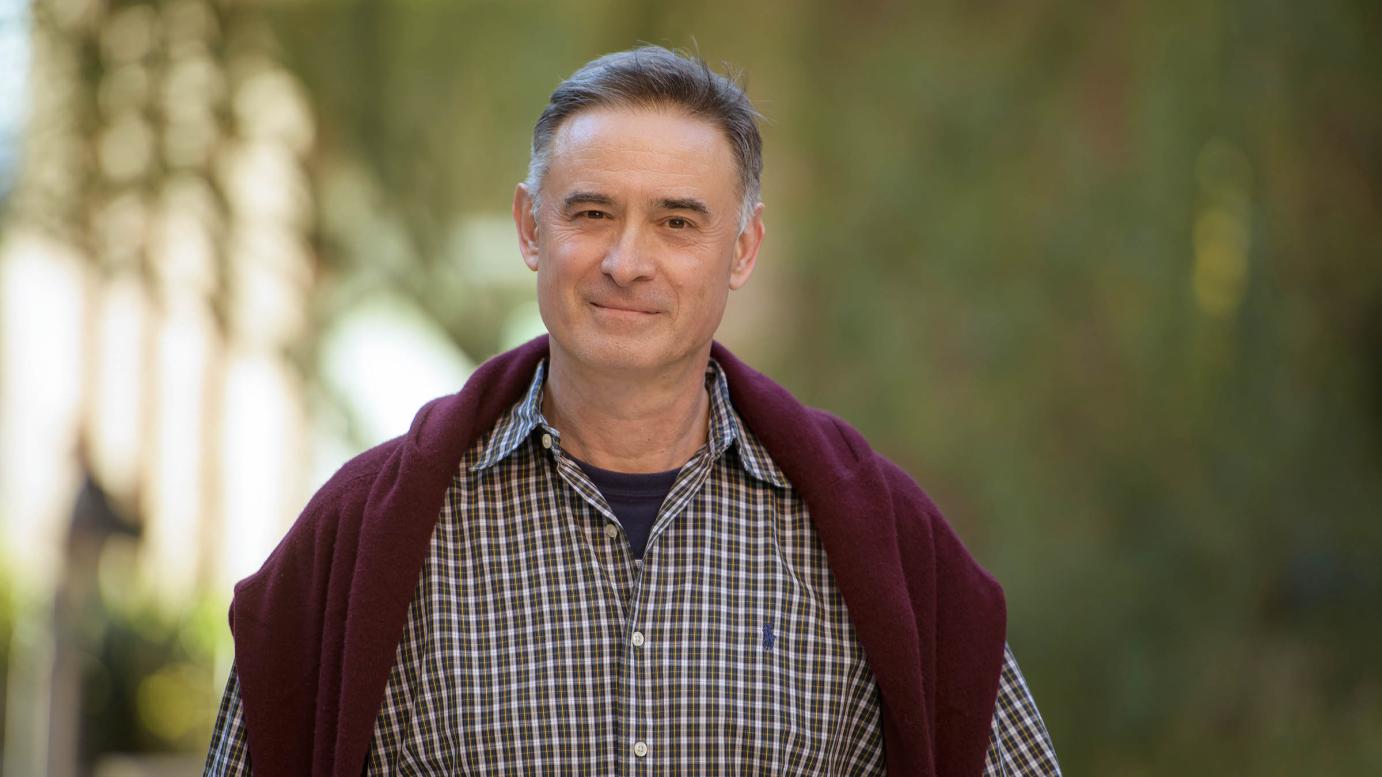
Janko Nikolich-Žugich, MD, PhD
An 11-year-old boy sat in a Belgrade hospital with a cough and fever. Doctors said he might have been exposed to tuberculosis, but he was more worried about something else they said. One of the patients there was feared to be positive for smallpox. It was 1972, and Yugoslavia was experiencing Europe’s last major outbreak of the dreaded disease.
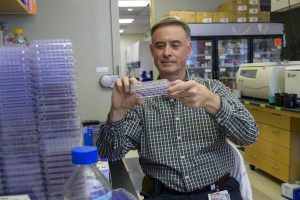
That boy was Janko Nikolich-Žugich, MD, PhD, who was never sure if he ever had tuberculosis – he was still treated for it – or if the other patient really did have smallpox. But living through an epidemic in his younger years sparked an interest in infectious diseases for Dr. Nikolich-Žugich, an internationally recognized immunologist and gerontologist at the University of Arizona Health Sciences.
Dr. Nikolich-Žugich leads a UArizona Health Sciences initiative to create defenses against disease including COVID-19, which he calls “a great example of an acute disease that we need to resolve and deal with right now.”
“Infections have really shaped our civilization more than anything else,” said Dr. Nikolich, head of the UArizona College of Medicine – Tucson’s Department of Immunobiology and co-director of the Arizona Center on Aging. “Our relationship with microbes is still one of the most critical relationships we have in this world in many ways.”
A career built battling infection
Dr. Nikolich’s decision to pursue a career in health care was influenced by more than his childhood illness – his father, grandfather and grandmother all happened to be doctors. He followed in their footsteps, receiving a medical degree and doctorate in immunology from Belgrade University. When he fulfilled his compulsory military service from 1986 to 1987, he spent most of his time providing medical treatment to the troops and their families.
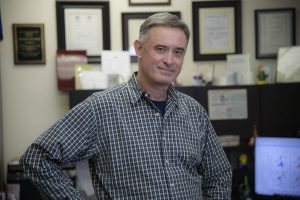
Dr. Nikolich-Žugich was honored as the Arizona Bioscience Researcher of the Year by the Arizona Bioindustry Association and the Gerontologist of the Year by the Arizona Geriatrics Society.
As Dr. Nikolich returned to a civilian career, he decided to emigrate to the United States, where opportunities to pursue serious research were plentiful. He started as an assistant professor at the Sloan-Kettering Institute for Cancer Research and in the Division of Molecular Medicine at the Cornell University School of Medicine and worked his way up to a senior scientist role in the Vaccine and Gene Therapy Institute at the Oregon Health and Science University.
In 2008, he joined the University of Arizona Health Sciences, where he continues to make discoveries and advances in the areas of immunity and infection in older adults. His research focuses on persistent viruses including cytomegalovirus, a herpesvirus that can lay dormant in the cells of a person’s body before reactivating later in life.
“That process of awakening or reactivating of the viruses can have a higher impact on us, or a lower impact on us, depending on our age and our condition,” said Dr. Nikolich.
A significant part of his career has been spent examining outbreaks of different viruses. He has studied different annual influenza outbreaks and the mosquito-borne Chikungunya virus and West Nile virus. The latter caused the largest recognized epidemic of neuroinvasive arthropod-borne viral illness in the Western Hemisphere in 2002. Around the same time, his laboratory geared up to study Severe Acute Respiratory Syndrome, or SARS, a viral respiratory disease caused by a coronavirus. While he did not end up working with that particular coronavirus, the preparation was useful when SARS-CoV-2 came around.
“Science forces you into doing new things all the time,” he said. “Biology will always have surprises for you. The more you have read about things in the past, without even knowing it will be helpful, that recall becomes really critical.”
Tackling the novel coronavirus
Dr. Nikolich’s decades of research into the immune system, infections and aging made him uniquely prepared to take on major challenges when the COVID-19 pandemic began.
“Science forces you into doing new things all the time. Biology will always have surprises for you.”
Janko Nikolich-Žugich, MD, PhD
As the mysterious SARS-CoV-2 virus was spreading in early 2020, he collaborated with Deepta Bhattacharya, PhD, professor in the Department of Immunobiology and BIO5 Institute member, to create one of the most accurate antibody tests in the world. Accuracy is of the utmost importance when dealing with such a widespread virus.
“We needed something that would be a lot more than 99% accurate,” said Dr. Nikolich, who also is a member of the BIO5 Institute.
The test is so accurate because it recognizes antibodies made in response to two independent parts of the virus’s spike protein. It will only return a positive result if there are antibody signals for both components. Having an extremely accurate antibody test gave the team more concrete evidence of past infections and provided more insight into how long antibody immunity might last. They were among the first to publish research about long-term immunity to COVID-19.
Pandemic hits close to home
Dr. Nikolich was in Serbia with his parents when the coronavirus began to march across Europe in March 2020. He doubts if he wore a mask on the plane home, as no one knew how the virus was being spread. Less than a year later, he again boarded a plane – double-masked this time – to visit his 97-year-old father, who had been diagnosed with COVID-19.
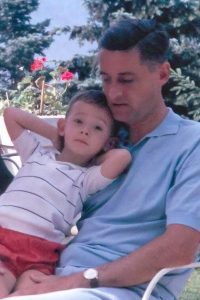
Three-year-old Dr. Nikolich-Žugich sitting on his father’s lap during a family vacation in France
“He fought the virus OK. He spiked pretty impressive antibody titers,” he said. “He never really developed full respiratory distress, but his body could not cope with it. He just stopped eating.”
In late 2020, COVID-19 claimed the life of Zarko Nikolic, MD.
“I was there to direct his care and make sure he was comfortable,” Dr. Nikolich said. “And that was a blessing.”
His mother, Mirjana Nikolic, passed away almost two years later. Consequences of a prior COVID-19 infection were likely a contributing factor. Dr. Nikolich said his passion for fighting COVID-19 was there before his parents passed away, but he shares the pain millions of people have felt from losing a loved one during the pandemic.
“My laboratory studies the decline of immunity in older adults. When a virus like this strikes, we have to do some research and try to understand it. One piece of data people might not realize is people over the age of 80 were dying of COVID-19 at a clip 270 times higher than people between 18-39,” he said. “That’s not 270% more, that’s 270-fold. That means for every one person age 18-39 who died, more than 270 people over the age of 80 were dying, and that is a staggering number.”
Preparing for the future
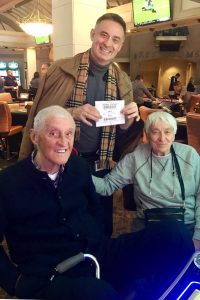
To study the long-term effects of COVID-19, the AZP3C team will recruit individuals who have experienced or are in the acute phase of COVID-19, including adults from vulnerable, older and underserved populations and representing diverse races and ethnicities.
Today, Dr. Nikolich continues to unravel the mysteries of the human immune response to COVID-19. Part of research is happening through the National Institutes of Health’s Researching COVID to Enhance Recovery (RECOVER) initiative, which is studying long COVID. Dr. Nikolich is leading the Arizona Post-SARS-CoV-2 Cohort Consortium (AZP3C), a six-institution statewide partnership supported by the RECOVER Clinical Science Core at New York University Langone Health.
Dr. Nikolich-Žugich enjoying some time with his late parents, Zarko and Mirjana Nikolic, at Desert Diamond Casino in Tucson.
Looking beyond COVID-19, Dr. Nikolich is uniting a team of experts to come up with solutions for the next pandemic as director of the Aegis Consortium, a UArizona Health Sciences initiative.
The Aegis Consortium’s focus is on prediction and preparedness, the acute and long-term aftereffects of pandemics on individuals and societies, and the use of built and natural environments in pandemic control. The three-pronged approach is designed to identify mechanisms and strategies to stave off new pandemics.
“We know a lot about the coronavirus and COVID-19, but there is still more to learn,” Dr. Nikolich said. “Unfortunately, we also know this will not be the last pandemic we see. The Aegis Consortium is uniting experts in research, technology and innovation to develop solutions that protect the world from future pandemics.”
SOURCE: https://healthsciences.arizona.edu/tomorrow/0822/understanding-infectious-diseases-improve-health
